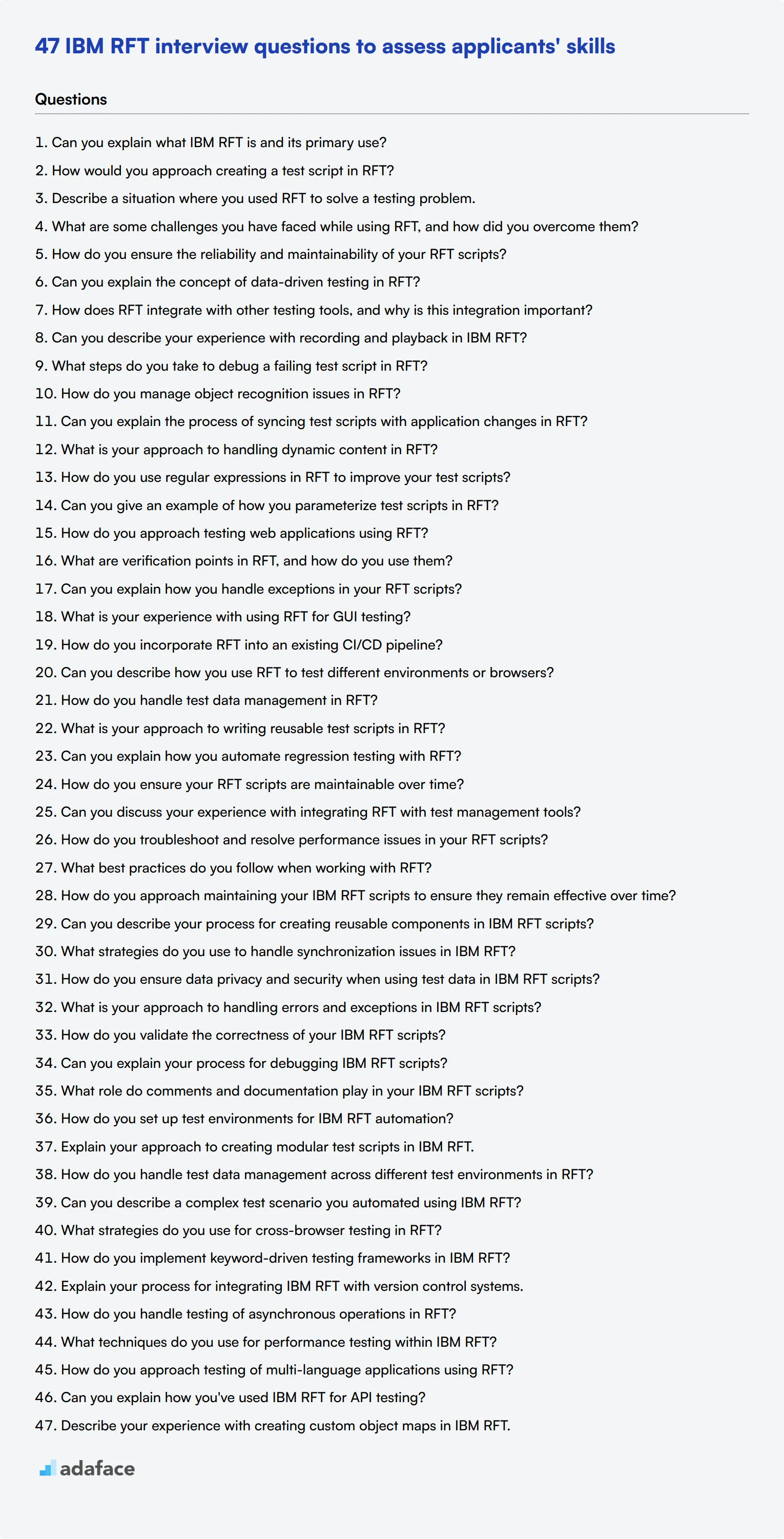Hiring the right testers for your team is crucial to ensure high-quality software. By asking the right questions, you can evaluate candidates' expertise in IBM Rational Functional Tester (RFT).
This blog post provides a comprehensive list of IBM RFT interview questions tailored for various levels of expertise, ranging from junior testers to scripting and automation experts. Whether you're assessing general knowledge or specific scripting skills, these questions will help you identify the best fit for your team.
Using these questions ensures you thoroughly assess candidates' capabilities and knowledge. Additionally, consider leveraging our IBM WebSphere test before interviews to streamline the hiring process.
Table of contents
7 general IBM RFT interview questions and answers to assess applicants
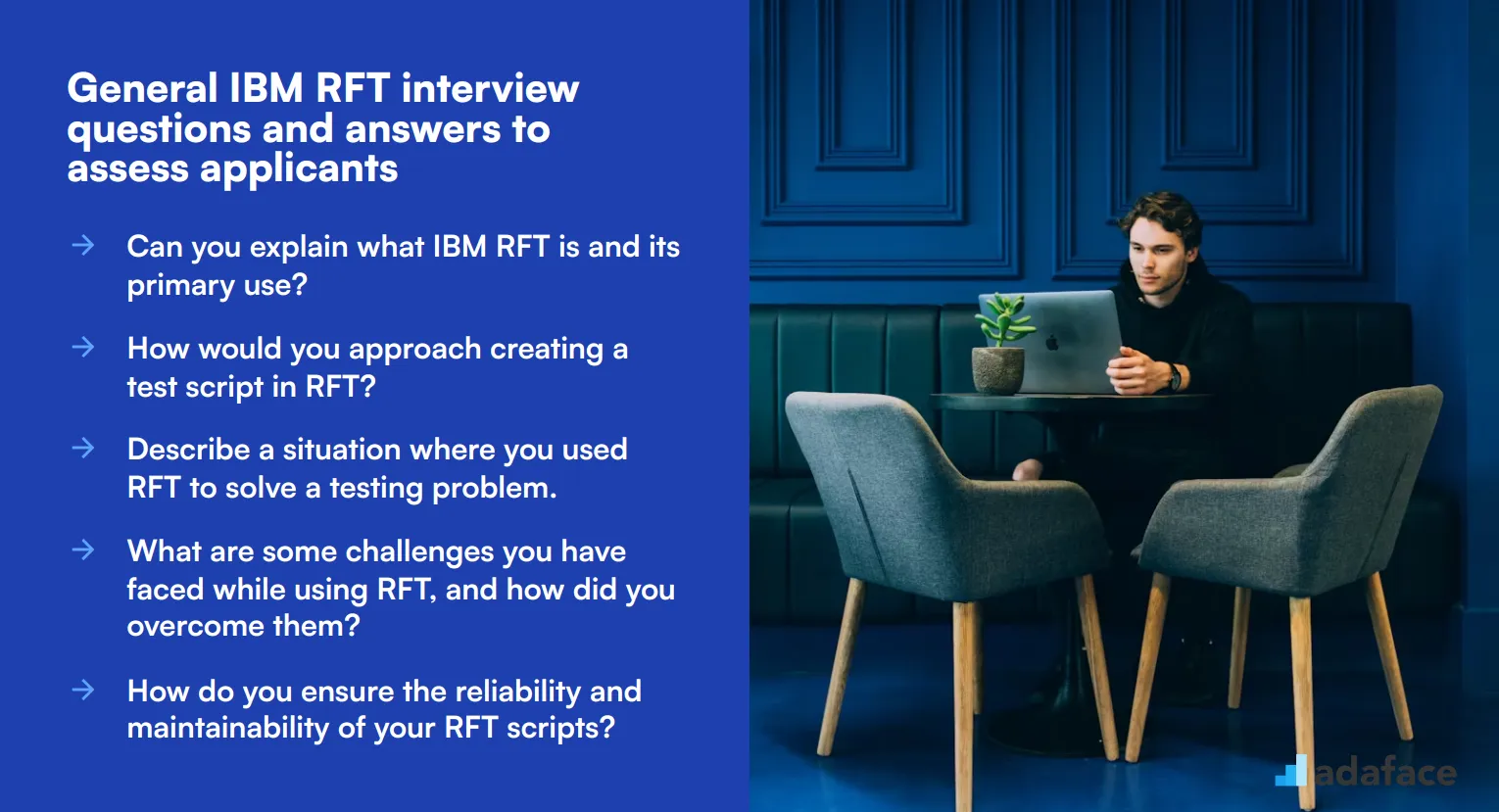
To effectively assess if your candidates are ready to tackle IBM Rational Functional Tester (RFT) tasks, use these targeted interview questions. Tailored to gauge both their general understanding and specific skills, these queries will help you identify the right fit for your team.
1. Can you explain what IBM RFT is and its primary use?
IBM Rational Functional Tester (RFT) is an automated functional and regression testing tool. It is primarily used to test applications on various platforms, including web-based, Java, and .NET.
Look for candidates who not only mention the basic use but also touch upon its integration with other IBM Rational tools. Ideal answers should reflect an understanding of the tool's versatility across different platforms.
2. How would you approach creating a test script in RFT?
Creating a test script in RFT typically involves recording user actions, which RFT translates into a script. This script can be edited using Java or Visual Basic .NET to enhance and customize the test cases.
Candidates should demonstrate familiarity with the recording process and scripting languages supported by RFT. A good response would also highlight their ability to customize scripts to meet specific testing needs.
3. Describe a situation where you used RFT to solve a testing problem.
In a past project, I used RFT to automate regression tests for a web application. The initial manual testing was time-consuming and error-prone. By implementing RFT, we reduced test execution time by 50% and improved accuracy.
Candidates should provide specific examples and quantify the benefits of using RFT. This shows their practical experience and the impact of their work.
4. What are some challenges you have faced while using RFT, and how did you overcome them?
One challenge I faced was the tool's initial setup and configuration, which took some time to align with our testing environment. I overcame this by consulting IBM's documentation and forums for best practices, which streamlined the setup process.
Look for candidates who can acknowledge difficulties and demonstrate problem-solving skills. An ideal response would show their resourcefulness and ability to leverage available resources.
5. How do you ensure the reliability and maintainability of your RFT scripts?
To ensure reliability and maintainability, I follow coding standards and best practices, such as modularizing the scripts and using descriptive naming conventions. Regularly updating the scripts to reflect changes in the application is also crucial.
Candidates should emphasize good practices like modularization, which aids in maintaining and updating scripts efficiently. Their answers should reflect a proactive approach to script management.
6. Can you explain the concept of data-driven testing in RFT?
Data-driven testing in RFT involves running the same test script with different sets of data inputs. This approach helps in validating the application's behavior with various data conditions without the need to create multiple scripts.
An ideal candidate should provide a clear and concise explanation and might also discuss the benefits, such as test coverage and efficiency improvements. Look for their understanding of how this method enhances testing processes.
7. How does RFT integrate with other testing tools, and why is this integration important?
RFT integrates seamlessly with other IBM Rational tools like Rational Quality Manager and Rational Test Workbench. This integration is important because it allows for comprehensive test management and execution, ensuring consistency and coverage across different testing phases.
Candidates should highlight the benefits of integration, such as streamlined workflows and enhanced collaboration. Their response should reflect an understanding of the broader IBM Rational ecosystem.
20 IBM RFT interview questions to ask junior testers
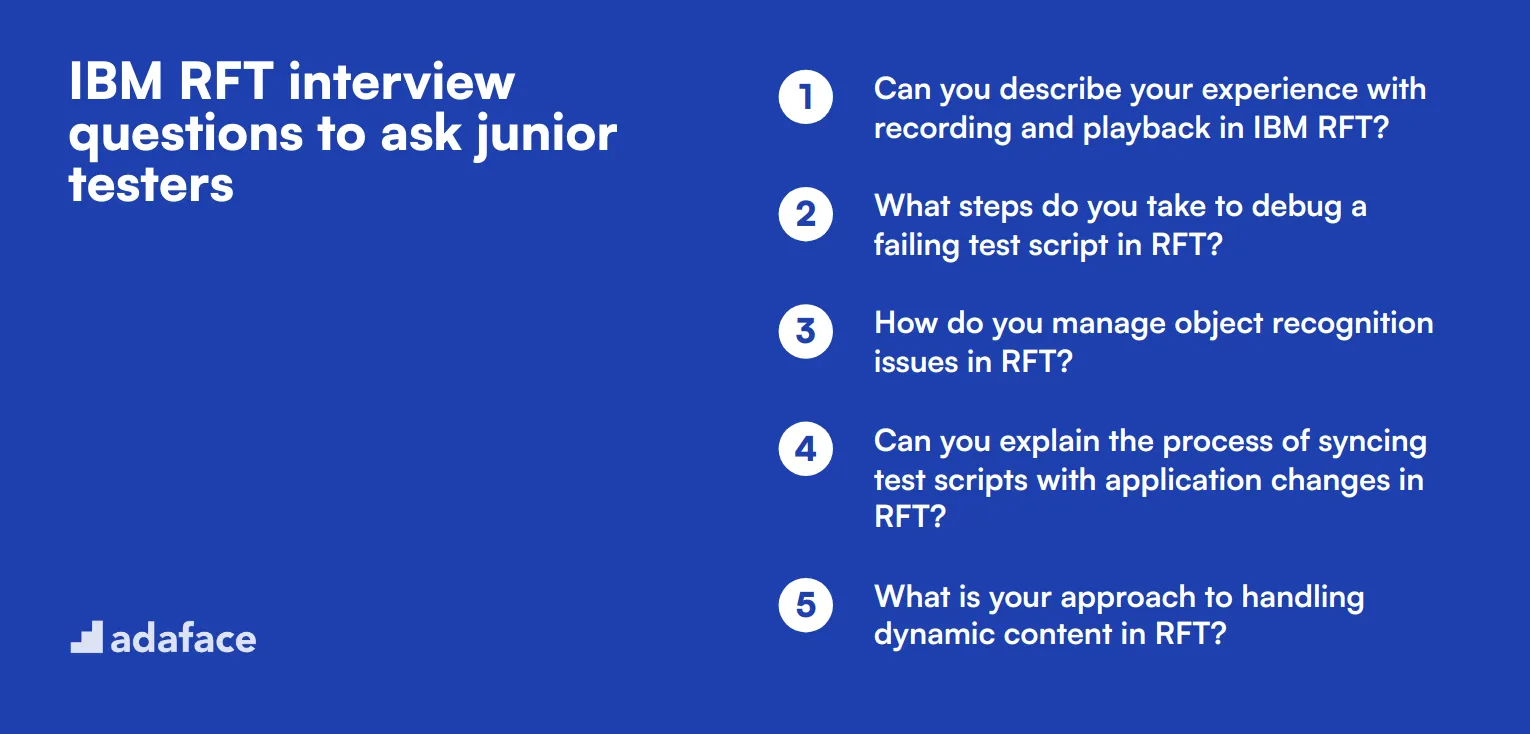
To ensure you hire capable junior testers proficient in IBM RFT, here are 20 tailored interview questions to guide you. These questions will help you gauge their practical knowledge and problem-solving abilities, ensuring they can handle tasks effectively. This can be particularly useful when you're drafting a software tester job description.
- Can you describe your experience with recording and playback in IBM RFT?
- What steps do you take to debug a failing test script in RFT?
- How do you manage object recognition issues in RFT?
- Can you explain the process of syncing test scripts with application changes in RFT?
- What is your approach to handling dynamic content in RFT?
- How do you use regular expressions in RFT to improve your test scripts?
- Can you give an example of how you parameterize test scripts in RFT?
- How do you approach testing web applications using RFT?
- What are verification points in RFT, and how do you use them?
- Can you explain how you handle exceptions in your RFT scripts?
- What is your experience with using RFT for GUI testing?
- How do you incorporate RFT into an existing CI/CD pipeline?
- Can you describe how you use RFT to test different environments or browsers?
- How do you handle test data management in RFT?
- What is your approach to writing reusable test scripts in RFT?
- Can you explain how you automate regression testing with RFT?
- How do you ensure your RFT scripts are maintainable over time?
- Can you discuss your experience with integrating RFT with test management tools?
- How do you troubleshoot and resolve performance issues in your RFT scripts?
- What best practices do you follow when working with RFT?
8 IBM RFT interview questions and answers related to scripting
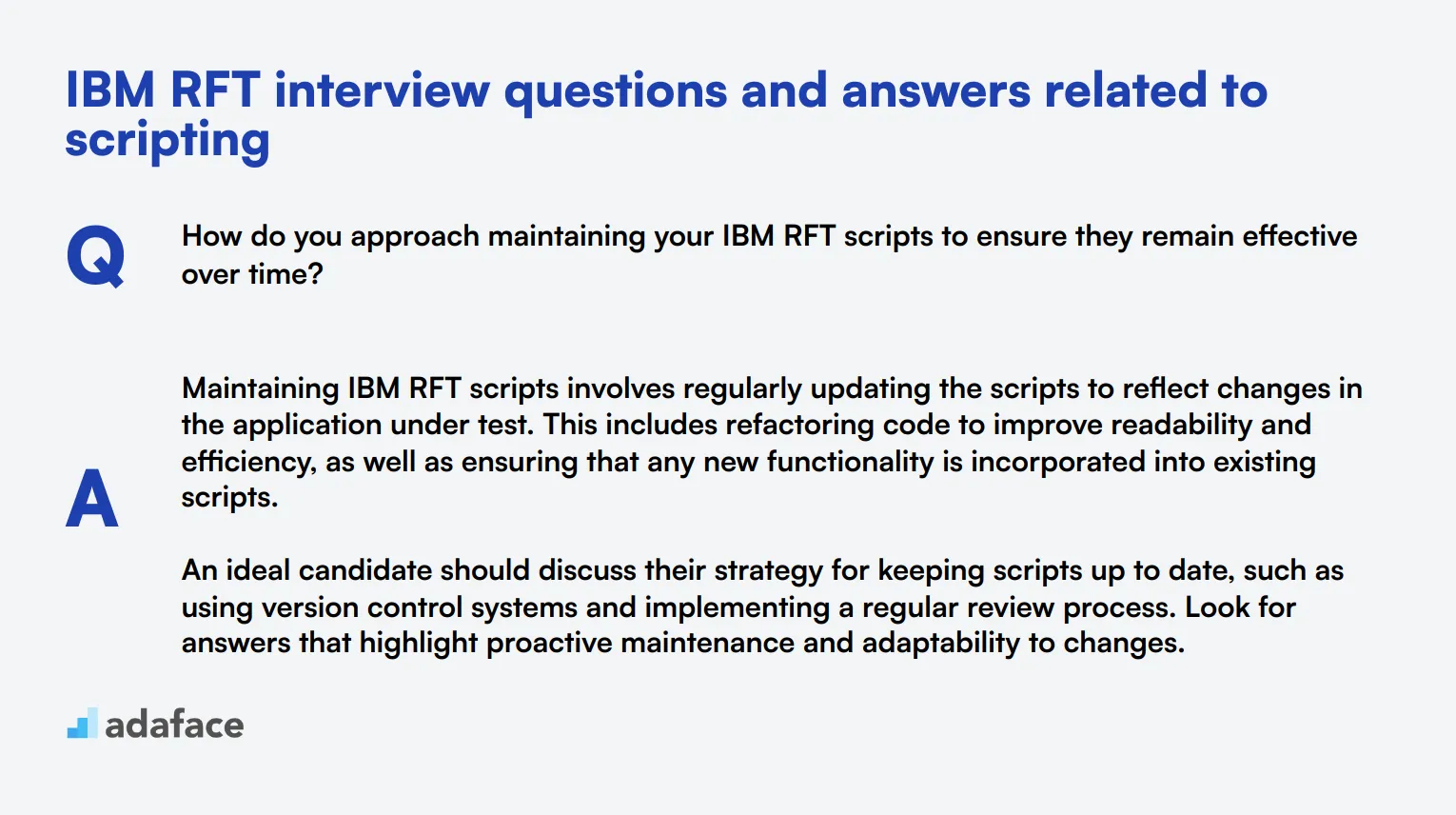
To ensure your candidates have the right scripting skills for IBM RFT, use this list of interview questions. It's designed to help you gauge their understanding and proficiency in writing effective test scripts.
1. How do you approach maintaining your IBM RFT scripts to ensure they remain effective over time?
Maintaining IBM RFT scripts involves regularly updating the scripts to reflect changes in the application under test. This includes refactoring code to improve readability and efficiency, as well as ensuring that any new functionality is incorporated into existing scripts.
An ideal candidate should discuss their strategy for keeping scripts up to date, such as using version control systems and implementing a regular review process. Look for answers that highlight proactive maintenance and adaptability to changes.
2. Can you describe your process for creating reusable components in IBM RFT scripts?
Creating reusable components in IBM RFT involves identifying common actions or sequences of actions that can be abstracted into functions or methods. This helps to reduce redundancy and improve the maintainability of test scripts.
Candidates should mention using modular design principles and organizing their code in a way that promotes reusability. Look for examples where they have successfully implemented reusable components in past projects.
3. What strategies do you use to handle synchronization issues in IBM RFT?
To handle synchronization issues in IBM RFT, I use waits to ensure that the application is in the correct state before performing any actions. This can involve implicit waits, explicit waits, or custom wait conditions.
An effective strategy includes regularly reviewing and adjusting synchronization points as the application evolves. The candidate should explain their approach to balancing wait times to avoid unnecessary delays while ensuring reliability. Look for their understanding of different wait mechanisms and their practical application.
4. How do you ensure data privacy and security when using test data in IBM RFT scripts?
Ensuring data privacy and security when using test data involves masking or anonymizing sensitive information and using secure storage solutions for test data. It is also important to follow company policies and industry standards regarding data protection.
Candidates should demonstrate awareness of data security best practices and provide examples of how they have implemented these practices in their projects. Look for their understanding of the importance of data security in testing environments.
5. What is your approach to handling errors and exceptions in IBM RFT scripts?
Handling errors and exceptions in IBM RFT scripts involves implementing robust error handling mechanisms, such as try-catch blocks, to gracefully manage unexpected situations. This ensures that the script can continue running or fail gracefully without causing further issues.
An ideal response should include an explanation of their methodology for identifying and handling potential errors, as well as their approach to logging and reporting issues. Look for a systematic approach to exception handling that enhances script reliability.
6. How do you validate the correctness of your IBM RFT scripts?
Validating the correctness of IBM RFT scripts involves thorough testing and peer reviews to ensure that the scripts perform as expected. This can include unit tests for individual components and integration tests for complete workflows.
Candidates should discuss their methods for verifying script functionality, such as using test data and comparing expected outcomes with actual results. Look for their commitment to quality assurance and their ability to identify and fix issues in their scripts.
7. Can you explain your process for debugging IBM RFT scripts?
Debugging IBM RFT scripts involves systematically identifying and resolving issues by using debugging tools and techniques. This can include setting breakpoints, stepping through code, and examining variable values to pinpoint the source of errors.
An effective candidate should outline their approach to debugging, including any specific tools or methods they use. Look for their problem-solving skills and their ability to troubleshoot complex issues efficiently.
8. What role do comments and documentation play in your IBM RFT scripts?
Comments and documentation play a crucial role in making IBM RFT scripts understandable and maintainable. They provide context and explanations for the purpose and functionality of the code, making it easier for others to understand and modify the scripts.
Candidates should emphasize the importance of clear and concise documentation and provide examples of how they document their work. Look for their commitment to maintaining high-quality documentation as part of their development process.
12 IBM RFT questions related to automated testing processes
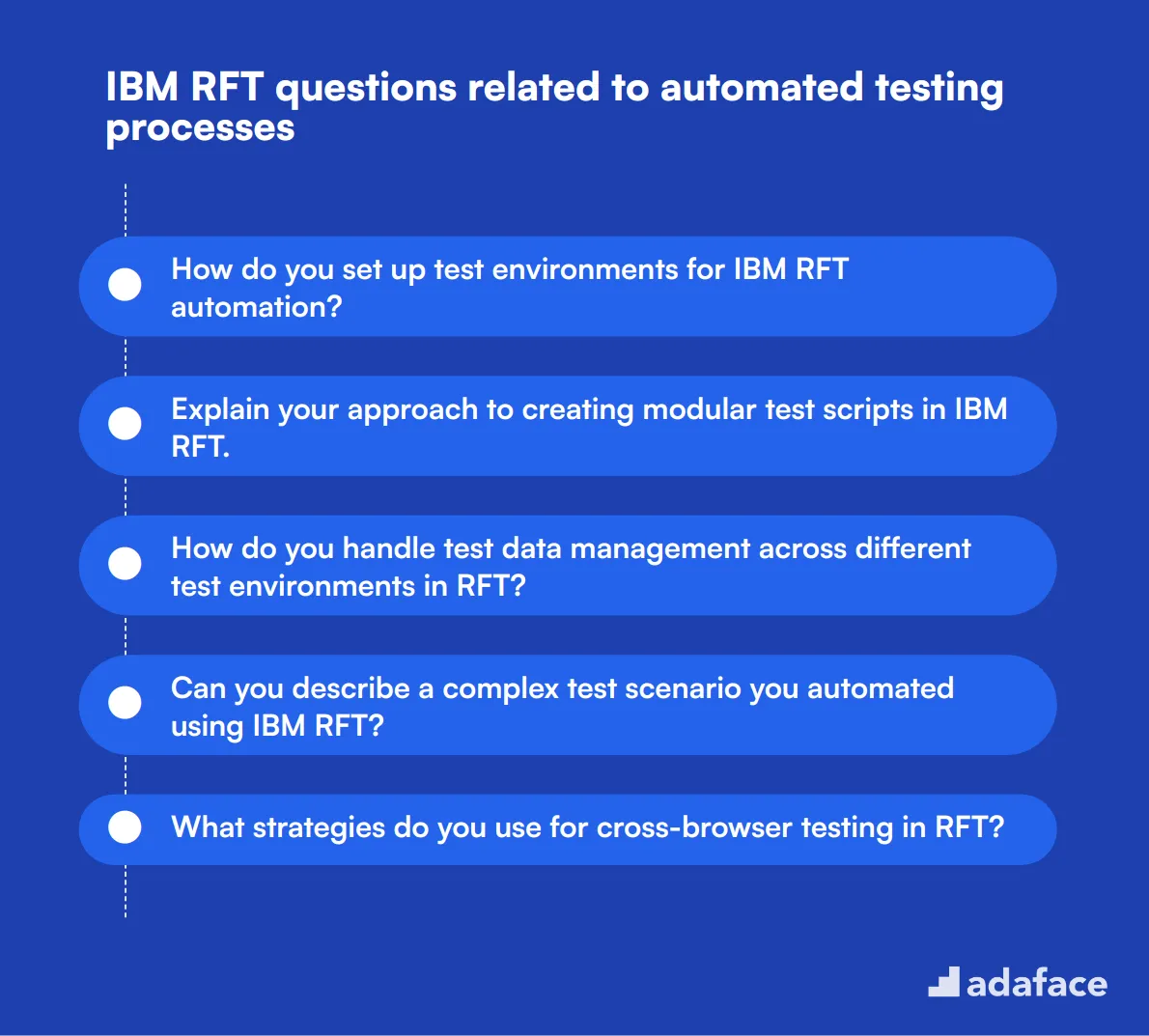
To assess candidates' proficiency in automated testing processes using IBM RFT, consider asking these 12 questions. These queries will help you evaluate a candidate's practical experience and problem-solving skills in real-world testing scenarios.
- How do you set up test environments for IBM RFT automation?
- Explain your approach to creating modular test scripts in IBM RFT.
- How do you handle test data management across different test environments in RFT?
- Can you describe a complex test scenario you automated using IBM RFT?
- What strategies do you use for cross-browser testing in RFT?
- How do you implement keyword-driven testing frameworks in IBM RFT?
- Explain your process for integrating IBM RFT with version control systems.
- How do you handle testing of asynchronous operations in RFT?
- What techniques do you use for performance testing within IBM RFT?
- How do you approach testing of multi-language applications using RFT?
- Can you explain how you've used IBM RFT for API testing?
- Describe your experience with creating custom object maps in IBM RFT.
Which IBM RFT skills should you evaluate during the interview phase?
While a single interview may not uncover all facets of a candidate's qualifications, it is essential to focus on core skills that predict success in using IBM Rational Functional Tester (RFT). Here we outline key skills to evaluate during the interview phase, which are directly linked to a candidate's potential effectiveness and aptitude with IBM RFT.
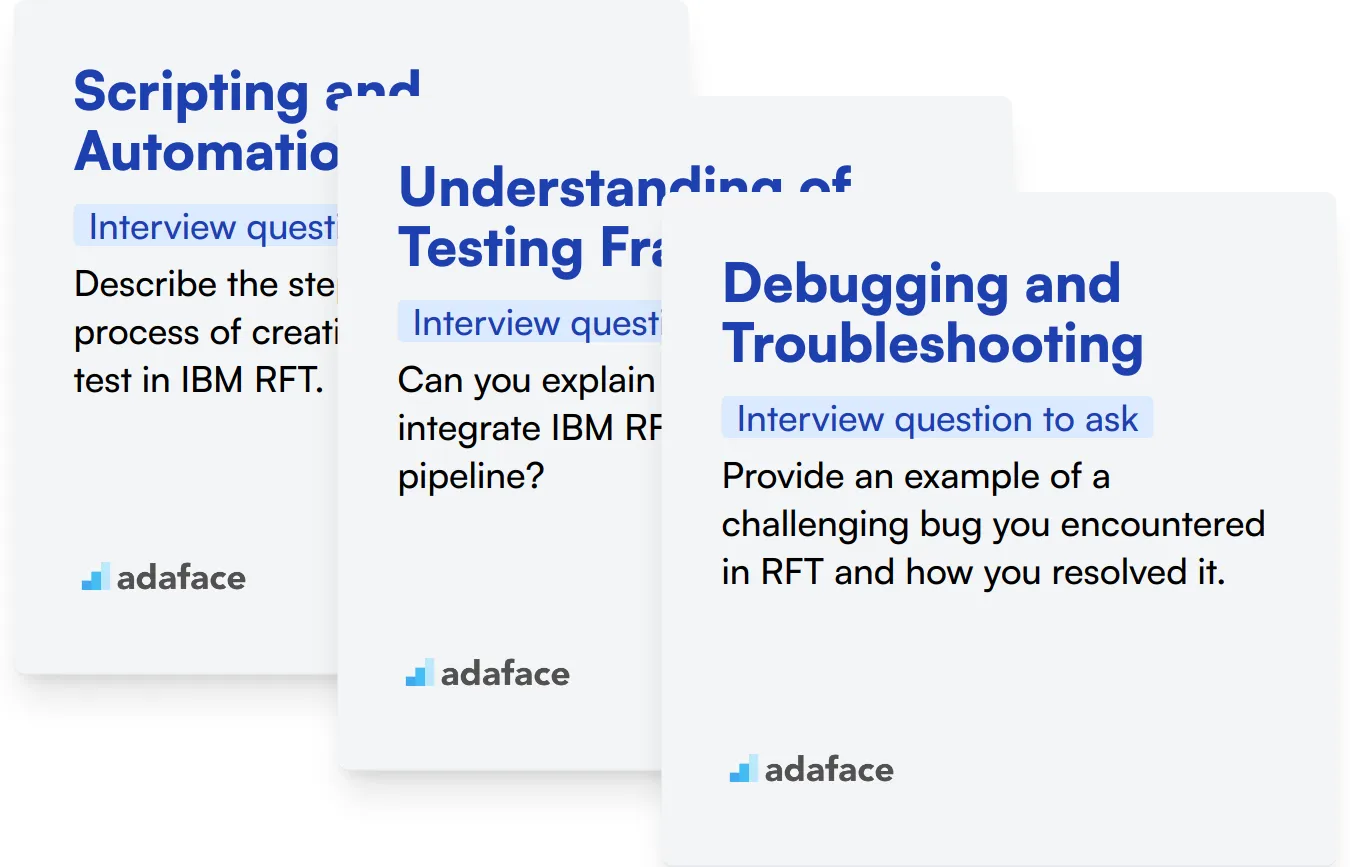
Scripting and Automation
Scripting and automation are fundamental for any RFT specialist. Mastery in creating, managing, and executing automated test scripts using RFT is crucial because it directly impacts the efficiency and coverage of testing cycles.
To preliminarily gauge the applicant's expertise in RFT scripting, consider deploying an assessment test with relevant MCQs. This helps filter candidates who have a solid understanding of automation concepts.
In addition to MCQs, pose scenario-based interview questions to assess practical knowledge and problem-solving skills in RFT scripting.
Describe the step-by-step process of creating a data-driven test in IBM RFT.
Look for clarity in their description of the test creation process, understanding of data-driven testing principles, and the ability to apply these in RFT.
Understanding of Testing Frameworks
An adept RFT user must understand various testing frameworks and their applications. This is fundamental, as it ensures the tester can effectively integrate RFT within different test environments.
To further explore this skill, interviewers should ask about real-world applications of these frameworks.
Can you explain how you would integrate IBM RFT with a CI/CD pipeline?
Assess the candidate's familiarity with Continuous Integration/Continuous Deployment practices and their ability to leverage RFT in such environments.
Debugging and Troubleshooting
The ability to quickly identify and resolve issues within test scripts or the RFT environment is a key skill. Efficient troubleshooting saves time and resources during the software development lifecycle.
To assess this essential skill, consider asking about past debugging experiences.
Provide an example of a challenging bug you encountered in RFT and how you resolved it.
Evaluate the candidate's problem-solving approach and their persistence in resolving complex software issues.
Streamline Your IBM RFT Hiring Process with Skills Tests and Targeted Interviews
When hiring for IBM RFT positions, it's important to verify candidates' skills accurately. This ensures you bring on board team members who can contribute effectively to your projects.
A practical way to assess IBM RFT proficiency is through skills tests. Consider using our IBM WebSphere test or Java test to evaluate candidates' relevant knowledge.
After administering these tests, you can shortlist top performers for interviews. This two-step process helps you focus on the most promising candidates, saving time and resources.
Ready to improve your IBM RFT hiring process? Sign up for Adaface to access our test library and streamline your recruitment workflow.
IBM WebSphere Online Test
Download IBM RFT interview questions template in multiple formats
IBM RFT Interview Questions FAQs
IBM Rational Functional Tester (RFT) is an automated testing tool for functional and regression testing of Java, Web, .NET, and other applications.
IBM RFT skills are valuable for testers as they enable efficient creation and execution of automated tests, improving software quality and reducing manual testing efforts.
You can assess IBM RFT skills through a combination of technical interview questions, practical coding exercises, and discussions about past projects and experiences.
Key areas include scripting knowledge, understanding of automated testing processes, familiarity with RFT features, and experience with test design and execution.

40 min skill tests.
No trick questions.
Accurate shortlisting.
We make it easy for you to find the best candidates in your pipeline with a 40 min skills test.
Try for freeRelated posts
Free resources




